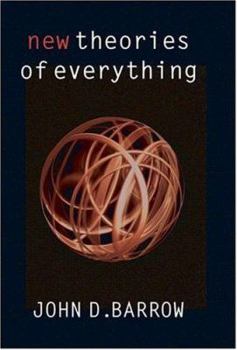New Theories of Everything
Select Format
Select Condition 
Book Overview
Will we ever discover a single scientific theory that tells us everything that has happened, and everything that will happen, on every level in the Universe? The quest for the theory of everything - a single key that unlocks all the secrets of the Universe - is no longer a pipe-dream, but the focus of some of our most exciting research about the structure of the cosmos. But what might such a theory look like? What would it mean? And how close are...
Format:Hardcover
Language:English
ISBN:0192807218
ISBN13:9780192807212
Release Date:July 2007
Publisher:Oxford University Press, USA
Length:260 Pages
Weight:2.30 lbs.
Dimensions:1.1" x 6.5" x 9.2"
Customer Reviews
3 ratings
To understand creation...an impossible dream
Published by Thriftbooks.com User , 15 years ago
I'm a big fan of Oxford's John Barrow. As a scientist he's distinguished himself among weighty competition like Frank Tipler in formulating the cosmic anthropologic hypothesis (which deals with the question of why we find ourselves in a universe so conducive to our own existence). As a science writer, he's also distinguished himself by taking weighty concepts like how the universe came to be and how far our science may ever be able to get in helping us understand where it and where it's going. His books Impossibility on the Science of Limits and the Limits of Science and the Constants of Nature occupy two of the most treasured spots on my bookshelf. And in my opinion Barrow doesn't disappoint in either this book or its 1991 original version. As observed by other reviewers Barrow endeavors to tell what is the continuing story of science's continuing quest to develop a theory of everything: a theory that explains the basic physical laws of the universe. A fully formed theory of everything would take us back to the very moment of creation and explain the process by which the universe came to be the way that it is. Along the way, understanding the way that the universe is has turned out to be a major challenge. That's because by dint of our occupancy on a rather mundane planet in a non significant solar system in what is an average galaxy doesn't exactly give us the best vantage point to view things they way they ultimately are. For one thing, the very matter of which we are composed according to modern physics is but four percent of the existing mass of the universe. For another thing, even the advanced physics of Albert Einstein is failing to answer some basic questions like why outlying solar systems ours move so orbit the galaxy so quickly. In other words, our efforts to give discription to the forces that govern our physical world at present seem to suffer from the major defect of not sufficiently understanding the phenomenon we are trying to describe. As always, Barrow is thorough in his treatment. Yet, and I think fairly, his book reflects the pessimism with which he views the possibility that we will soon come up with a reasonable theory of everything...including even the much bally hooed discussion about string theory. String theory is a mathematical model of the universe which says that there are eleven dimensions of physical reality (as opposed to the four we easily perceive). It's a mathematical bohemeth and for reasons alluded to by Peter Woit in The Problem with Physics among other recent volumes I think the theory suffers from some insurmountable problems. Fortunately this Barrow volume gives a fair sense of the pros and cons and as always gives the reader an excellent ring side view of the academic dispute. So for these reasons and more I highly recommend this book or for that matter pretty much any book by Barrow. He's a great scientist and a great writer.
Regarding Science-Ejected Vitalism, 2007:
Published by Thriftbooks.com User , 16 years ago
Vitalism is a profoundly science-ejected concept, though many CAM or 'natural health' cabals falsely claim that vitalism survives scientific scrutiny. One of my favorite passages from this book: "there is no reason to believe that the stuff of biology is made of anything but the atoms and molecules that the chemist studies; nor any reason to think that those atoms and molecules are composed of anything but the elementary particles of the physicist, any more than we would doubt that Michelangelo's Pieta is composed of raw material other than marble and stone. But such reductionism is trivial. It was worth stating only when there were baseless speculations that some mysterious substance ('phlogiston') was present in fire or some elan vital in 'living' things. As we bring simple things together, they produce aggregates that exhibit a wider diversity of behavior than the sum of their parts. Thus qualitatively new phenomena appear as the level of complexity rises or the number of ingredients increases. Such a situation was not foreseen by early vitalists [p.164]." Meanwhile, naturopathy claims... -r.c.
I'm buying a copy after reading a borrowed one!
Published by Thriftbooks.com User , 16 years ago
I real lots of physics/cosmology books. This one organized and written for comprehension - and the first I've encountered to integrate chaos and complexity processes as well as Steve Wolfram's New Kind of Science with QM and Strings - not flashy but impressive.





